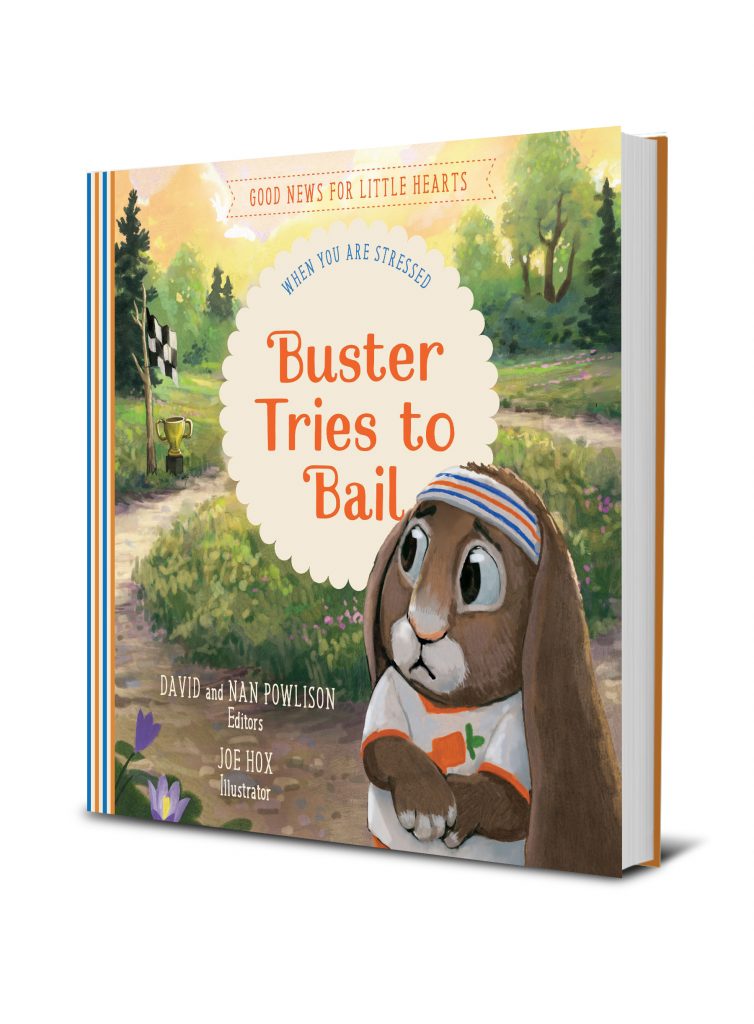Because children often absorb stress from their environment, helping your child through emotional turmoil and strain means starting with an assessment of your own level of stress. “HELP!” you might say. “My life is a stress mess!” When we remember the truth that we can’t get everything done or do everything perfectly, we can begin to take a step back and breathe. We can learn to rely on the work of another—our friend and Savior, Jesus Christ. He has paid for all that we have left undone or done wrong. Resting in him and depending upon his power is the key to moving forward. When we trust in him, we can lean confidently on his forever-true promises:
• You are not alone. “I am with you always, to the end of the age” (Matthew 28:20).
• You can ask for help. “If any of you lacks wisdom, let him ask God” (James 1:5).
• You don’t have to be afraid. “God gave us a spirit not of fear but of power and love and self-control” (2 Timothy 1:7).
With these promises in mind, take time to sit quietly, gather yourself before God, and give him your heart. Hide in his perfect love and care for you. Read the Scripture verses and meditate on them. Rest and pray. Then pick one thing to do that will make your environment more peace-filled (e.g., straighten a room, wash the dishes, put in a load of laundry, pick flowers for the table). Do something that when finished you can say, “It is good.” Then sit back down and rest. When we are stressed, it helps to do one thing at a steady pace prayerfully. Stress happens when we feel overwhelmed and live under that strain instead of under God. As you are learning to live under God’s care, share these truths with your child. You can learn together how to live under God instead of under stress.
1. Everyone experiences stress when they are under pressure.
Pressure can come from inside (when we want to accomplish something or do well with a task) and outside (when someone expects something of us). Start by acknowledging to your child that at times we all live under stress, and the most important thing is who we turn to for help and whose voice we listen to.
2. Sometimes we don’t realize how stressed we are.
Sometimes we keep trying harder and harder until it becomes too much, and we suddenly hit our breaking point or decide to quit. You may see the same thing happening to your child. When you notice your child is stressed, start by asking questions about the pressures he or she is feeling. Don’t assume that you know exactly what is bothering your him or her. Take the time to listen instead of jumping right away to “the answer.”

3. We react to stress in different ways at different times.
Sometimes we react to stress by working harder (for our kids, it may be extra sports practices), sometimes we react by trying to escape (such as deciding to quit the team), sometimes we get angry (and take it out by yelling at family members), and sometimes when we feel stressed we put others under stress (as a coach might on his team). You might start a conversation about stress with your children by sharing how you have reacted to stress at different times in your life, and then asking them to share what they do when they are stressed out.
4. Encourage your children to bring all of their stressors to God and tell him all about it.
Psalm 55:17 (NLT) says, “Morning, noon, and night I cry out in my distress, and the Lord hears my voice.” Remind them that they can go to God any time of the day or night, whenever they are experiencing stress, and he will hear their voice.
5. Learn to listen to Jesus’s voice.
Our stress can build as we listen to the voices around us. The stress can grow as we listen to everyone else except Jesus, the one we should be listening to. The voices around us may be shouting, “Run faster, try harder, be the best.” All those voices drown out Jesus’s voice saying, “Give all your worries and cares to God, for he cares about you” (1 Peter 5:7). Remind your children often that Jesus cares for them. He counts every hair on our heads and knows when one falls. He who watches over every sparrow is always watching and keeping them (Matthew 10:29–31).
6. The greatest mark of Jesus’s love and care for us is his giving his own life for his people.
Because Jesus cares for us, he went to the cross and paid for the sins of all who turn to him in faith. After he rose from the dead, he promised all those who believe in him “I am with you always, even to the end of the age” (Matthew 28:20). When you put all of your trust in Jesus, you can live under his care, instead of under stress. Under God we are always protected. The Bible promises us, “He will cover you with his wings. Under the feathers of his wings you will find safety. He is faithful. He will keep you safe like a shield or a tower” (Psalm 91:4 NIRV).
7. What we are most stressed about reveals our deepest desires, hopes, and fears.
A child wants to run fast and win his race. He also wants to make his coach happy. His coach wants to be coach of the year again. There was nothing wrong with these desires, but we can make a good thing too important. When we want anything more than we want to live under God, we will be stressed. When we let our desire for even a good thing take center stage in our lives, then we are controlled by that desire instead of being controlled by love for God and people (James 4:1–3). Encourage your children to go to God with all of their desires, hopes, and fears and to ask God for forgiveness for the ways in which they have made something they want more important than loving God. God promises that when we do that, he will keep us in perfect peace (Isaiah 26:3).
8. Remind your child that God is in control of the world.
Children (and adults!) experience fear when the world seems out of control. They can be stressed just to be listening to the news. The reports of death, diseases, wars, natural disasters, etc., can seem all too close (and sometimes they are). But we are living under God’s care. We trust that he is in charge, and he has a good plan to bring all of his people safely home (Revelation 21:3–4). Remind your child often of God’s words to us:
“You will keep in perfect peace all who trust in you, all whose thoughts are fixed on you! Trust in the Lord always, for the Lord God is the eternal Rock.”
Isaiah 26:3–4 NLT
The above content was adapted from Buster Tries to Bail: When You Are Stressed.

BUSTER TRIES TO BAIL: WHEN YOU ARE STRESSED
Buster loves racing, but the more he thinks about the upcoming competition at the county fair for who will be the fastest animal in Mulberry meadow, the more stressed he gets. No matter how hard he trains, he can’t eat or sleep, and eventually he decides he wants to quit running.





